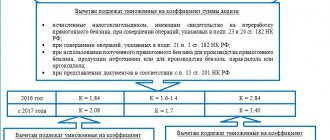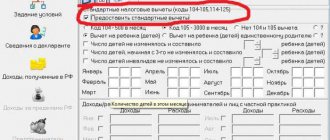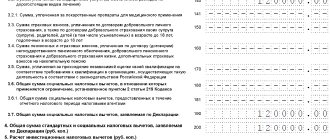How to deduct VAT
Each taxpayer-buyer has the right to reduce the accrued value added tax by the amount of “input” VAT on purchased goods (works, services).
The article “What are VAT deductions?” will tell you what VAT deductions are and how to apply them correctly.
This right is granted to him in accordance with paragraph 1 of Art. 171 Tax Code of the Russian Federation. At the same time, in accordance with this article, tax amounts that were (clause 2 of Article 171 of the Tax Code of the Russian Federation) are subject to deductions:
- paid when importing goods into Russia, both those that have undergone customs clearance and those that are transported without customs clearance;
- presented by sellers when purchasing goods and services (as well as when making advance payments for future deliveries) in the territory of the Russian Federation.
Please note that there is no right to deduct VAT if:
- goods were purchased and will be sold outside the Russian Federation (letter of the Ministry of Finance dated November 9, 2011 No. 03-07-13/01-46);
- goods purchased in Russia will be sold outside the country (letter of the Ministry of Finance dated November 25, 2011 No. 03-07-13/01-49).
Conditions for accepting VAT for deduction
In order to exercise the right to deduct VAT, it is necessary to comply with a number of requirements prescribed in paragraph 1 of Art. 171 and paragraph 1 of Art. 172 of the Tax Code of the Russian Federation:
- Goods (work, services) were purchased to carry out operations that are subject to VAT.
- Goods (work, services) are accepted for accounting (primary documents must be available).
- The seller provided a correctly executed invoice.
IMPORTANT! Another requirement for imported goods is the availability of payment documents that confirm the fact of payment of VAT upon import into the Russian Federation.
Invoice from the “special regime”
As you know, organizations and individual entrepreneurs that apply special tax regimes are exempt from paying VAT, and therefore from the obligation to issue invoices. However, sometimes they can issue an invoice with an allocated amount of VAT if the counterparty has asked them to do so. Why the counterparty asks for this, we think, is clear - to save on taxes by applying the deduction of “input” VAT. But the fact is that such a service can backfire for the counterparty.
Local tax officials, and even officials of the Ministry of Finance, believe that the buyer does not have the right to take advantage of the VAT deduction on the invoice issued to him by the seller (executor) under a special regime (letters of the Ministry of Finance of the Russian Federation dated October 5, 2015 No. 03-07-11/56700, dated 16.05 .2011 No. 03-07-11/126).
They explain their position by the fact that invoices are issued by VAT payers. A supplier using a special regime is not a VAT payer. Consequently, the invoice issued by him is recognized as being drawn up in violation of the law.
But this position cannot be called indisputable. The courts believe that the buyer has the right to accept VAT as a deduction on an invoice issued to him by a counterparty who applies a special tax regime (decision of the Constitutional Court of the Russian Federation dated 03/29/2016 No. 460-O, dated 06/03/2014 No. 17-P, resolution of the Presidium of the Supreme Arbitration Court RF dated January 30, 2007 No. 10627/06). After all, he pays the amount of VAT illegally allocated in the invoice to the budget on the basis of paragraph 5 of Article 173 of the Tax Code of the Russian Federation. Accordingly, the “mirror” principle of VAT is observed.
Thus, if a company decides to deduct VAT on an invoice received from a counterparty under a special regime, it may face claims from tax authorities during an audit. However, in court, most likely, you will be able to defend your right to a deduction, since judicial practice is on the side of taxpayers.
Acceptance of VAT for deduction: some features
First of all, for VAT to be deductible, it does not matter whether payment was made for the purchased goods. This means that the buyer can deduct VAT even with outstanding accounts payable (letter of the Ministry of Finance of Russia dated June 21, 2013 No. 03-07-11/23503, Federal Tax Service of Russia dated September 3, 2010 No. ShS-37-3/10621, resolutions of the Federal Antimonopoly Service Vostochno -Siberian District dated 02.25.2010 No. A74-3115/2009, FAS Central District dated 02.15.2011 in case No. A68-896/10).
As a general rule, from January 1, 2015, VAT is deducted in full on expenses that are normalized for income tax. From the specified date, para. 2 clause 7 art. 171 of the Tax Code of the Russian Federation, according to which VAT was deducted in an amount corresponding to the standard for recognizing expenses for income tax.
If you have access to ConsultantPlus, check whether you have correctly accepted VAT for deduction. If you don't have access, get a free trial of online legal access.
The exception is travel and entertainment expenses. The deduction of VAT on such expenses continues to be standardized (clause 7 of Article 171 of the Tax Code of the Russian Federation).
Value added tax deduction can also be applied in the following cases:
- if the purchased goods were paid for using funds subsidized from municipal (regional) budgets (letter of the Ministry of Finance dated November 2, 2012 No. 03-07-11/475);
- compensation for the costs incurred was made by the insurer (letter of the Ministry of Finance dated July 29, 2010 No. 03-07-11/321);
- at the request of the seller, payment for the goods was made to a third party, if this was specified in the supply agreement (letter of the Ministry of Finance dated November 22, 2011 No. 03-07-11/320).
VAT deduction - 2022: invoice requirements
What requirements does tax legislation impose on invoices in order to be able to accept VAT on them as an “input” when calculating tax and filling out a tax return? They must contain:
- number and date;
See: “VAT deduction: if the invoice is dated to the next quarter.”
- names, addresses, TIN of the supplier and buyer;
- names, addresses of the shipper and consignee;
- payment document number (if advance payments were made);
- a list of goods indicating units of measurement or a description of services;
- quantitative indicator of goods shipped or work performed;
- unit price excluding VAT;
- total cost excluding VAT;
- tax rate;
- the amount of VAT calculated at the specified rate;
- total cost including VAT;
- country of origin of goods, customs declaration number (if the goods are foreign-made).
The algorithm for filling out the current invoice form can be viewed in our video review, which we posted here.
The rule for signatures on the invoice: it must be endorsed by the head and chief accountant of the company (if this document is issued by an individual entrepreneur) or other authorized persons who have the appropriate permit. The electronic invoice is certified by the electronic signature of the manager or other employees authorized for this action.
Thus, upon receiving an invoice from a supplier, you must carefully analyze it to ensure that it is correctly filled out and complies with all tax law requirements. And if everything is in order, the deduction can be applied. If not, you should give the document to the supplier for rework.
Reasons for refusal to accept VAT for deduction
The main reason for refusal to use the right to deduction is an incorrectly executed invoice. At the same time, it is necessary to pay attention to the fact that errors in the preparation of such a document, which do not create problems for the inspector with identifying the parties to the transaction, the object of taxation, the calculated tax amounts and the VAT rate, are not grounds for refusing to accept them. This norm is prescribed in paragraph 2 of Art. 169 of the Tax Code of the Russian Federation.
See also our material “What errors in filling out an invoice are not critical for VAT deduction?” .
Also, VAT deduction will be denied if:
- there are no primary documents confirming the purchase of goods (works, services);
- goods (work, services) were not accepted for accounting;
- the purchased goods were subsequently used in activities that are not subject to VAT.
In practice, the tax office refuses to deduct VAT in the following cases:
- lack of sales during the tax period in which the right to deduction was claimed;
- using the deduction partially, that is, splitting the amount of tax to be deducted under one invoice into several parts;
- The tax inspectorate is confident that the seller is evading payment of VAT (in this case, the buyer and seller are accused of creating a scheme to illegally reimburse VAT from the budget).
Read about actions that allow you to challenge a refusal to deduct in the material “[LIFEHACK] We defend VAT deductions for “dubious” counterparties.”
For the most frequently identified errors when applying VAT deductions, see the material “[LIFE HACK] How not to reduce VAT payable.”
Let's look at some of these cases in more detail.
VAT deduction in the absence of sales
For a long time, officials believed that the lack of sales (tax base) prevented them from receiving a VAT deduction. However, after some time, the financial department and the Federal Tax Service of Russia changed their position. Thus, officials admitted that the presence of a VAT tax base is not a condition for deduction (see letters from the Ministry of Finance of Russia dated November 19, 2012 No. 03-07-15/148, Federal Tax Service of Russia dated February 28, 2012 No. ED-3-3/ [email protected] ).
Therefore, if the tax office denies you a VAT deduction, you can safely challenge this decision. Note that the courts fully support the taxpayer. For example, the Arbitration Court of the Far Eastern District rejected the tax inspectorate’s argument that in the absence of activities aimed at generating income, the deduction is unlawful. The judges indicated that the Tax Code of the Russian Federation does not contain such a condition for deducting VAT as the presence of sales transactions in the tax period (resolution of the Far Eastern District AS dated November 17, 2014 No. F03-4979/2014, West Siberian District AS dated December 7, 2015 No. F04 -27771/2015 in case No. A46-2573/2015).
Splitting the deduction amount for one invoice into several parts
Since 2015, the question of the possibility or impossibility of splitting the deduction has become irrelevant. The edition of the Tax Code of the Russian Federation, in force since 2015, allows deductions to be made within 3 years from the date of registration of the acquisition (clause 1.1 of Article 172 of the Tax Code of the Russian Federation), in very rare cases limiting it to the full amount (paragraph 3, clause 1, p. 4 Article 172 of the Tax Code of the Russian Federation, letter of the Ministry of Finance of Russia dated December 19, 2017 No. 03-07-11/84699) presented by the tax supplier.
About the possibility of splitting the VAT deduction on fixed assets, read the article “Is VAT deduction on fixed assets allowed in parts?”
How to deduct “import” VAT, read the material “Import” VAT: can it be deducted in parts?”
Invoice with incorrect rate
There are situations when the seller does not know exactly what VAT rate to apply and, in order to avoid risks for himself, decides to apply the maximum rate of 18%, reflecting it in the issued invoice.
This happens, for example, in relation to freight forwarding services associated with international deliveries, for which in most cases a zero VAT rate is applied. Of course, by indicating the maximum rate, forwarders will protect themselves from possible claims from tax authorities, but at the same time they are “setting up their” customers.
The fact is that in such cases, customers almost always have problems with deducting VAT. Officials believe that if services are taxed at a rate of 0%, then it is impossible to apply a deduction for improperly billed tax amounts. This position can be seen, for example, in the letter of the Ministry of Finance of Russia dated April 25, 2011 No. 03-07-08/124. In it, officials explain: an invoice in which the tax rate is indicated incorrectly does not comply with the requirements of tax legislation, and therefore cannot be recognized as a basis for accepting the presented VAT amounts for deduction.
Unfortunately, in this case, judicial practice is far from being in favor of companies.
Proof of this is, for example, the decisions of the Far Eastern District AS dated October 4, 2016 in case No. A51-1939/2015, the Ural District FAS dated March 28, 2013 No. F09-1830/2013 in case No. A47-3202/2012 (determined by the Supreme Arbitration Court of the Russian Federation dated July 25 .2013 No. VAS-9132/13 refused to transfer this case to the Presidium of the Supreme Arbitration Court of the Russian Federation).
Transferring the deduction to a later period
Since 01.01.2015, the Tax Code of the Russian Federation has enshrined the taxpayer’s right to apply a VAT deduction within 3 years from the date of registration of purchased goods (works, services) (Clause 1.1. Article 172 of the Tax Code of the Russian Federation). The established 3-year period will expire simultaneously with the deadline for submitting a declaration for the same quarter in which 3 years earlier the acquired goods (work, services) were registered (letter of the Ministry of Finance of Russia dated May 12, 2015 No. 03-07-11/27161 ).
However, some deductions cannot be transferred to a later period (letters of the Ministry of Finance of Russia dated October 17, 2017 No. 03-07-11/67480, dated April 9, 2015 No. 03-07-11/20290 and No. 03-07-11/20293), and they must be taken into account in reducing the accrued tax in full in the quarter when the appropriate conditions for this arose. These are the deductions:
- on OS, intangible materials, and equipment for installation imported to Russia;
- VAT tax agent;
- advances issued and received;
- travel expenses.
See also the material “Transferring the VAT deduction to another period - when it is prohibited.”
Condition 2: acceptance for accounting
The next condition for applying the VAT tax deduction, which we will consider, is the need to accept goods, services, and accounting rights. The subtlety is that the Tax Code of the Russian Federation does not specify what kind of accounting we are talking about, and this sometimes creates problems due to differences in the interpretation of this concept by taxpayers and tax authorities.
Indeed, there are several types of accounting, for example accounting, warehouse, management, tax. Which of them should be preferred for the purpose of applying VAT deductions? The most reasonable thing that can be done in such a situation is to follow the procedure for registration, which is established in accounting legislation, namely in the Law “On Accounting” dated December 6, 2011 No. 402-FZ.
According to this document, the basis for recording any business transaction in accounting appears when there is a primary document for it. Thus, confirmation of the fact of registration of goods or services will be the presence of all the necessary primary information on them. Moreover, it then has legal force when all the necessary details are filled out and signatures are present. Tax authorities often use existing “defects” in primary documents to declare a VAT deduction illegal.
We also note that the Tax Code of the Russian Federation does not define any specific accounts on which “purchases” should be reflected. This also often causes disagreements with inspectors. For example, is it legal to take advantage of the deduction if the object is listed on accounts 07 or 08, or can it be applied only when the fixed asset moves to account 01?
You will find the answer to this question in our material How to claim VAT on fixed assets or equipment for deduction.”
Deduction for “late” invoices
From 01/01/2015 in clause 1.1 of Art. 172 of the Tax Code of the Russian Federation establishes that if an invoice is received after the end of the tax period in which goods (work, services), property rights are registered, but before the deadline for submitting the declaration for this period, then VAT can be deducted during the acquisition period.
ConsultantPlus experts explained what documents can be used to confirm VAT deductions:
If you do not have access to the K+ system, get a trial online access for free.
Condition 1: participation in taxable transactions
So, tax deductions for VAT can be used when the “input” VAT relates to those objects that are involved in transactions subject to this tax. Moreover, it does not matter how the acquired resources will be used - in production itself or indirectly. For example, purchased office furniture is not directly involved in any production cycle of the company, but it creates the necessary conditions for the work of its employees and is related to its taxable activities. In this case, you can also use VAT deduction.
Please note that the Tax Code of the Russian Federation does not link the possibility of applying a deduction with the moment the resources begin to be used in taxable transactions. That is, if we consider the example of production, the VAT deduction can be used immediately after the purchase of materials, and not when they are released into production. The same applies to expenses of future periods - VAT on them is immediately deductible in full.
Results
VAT deduction is the amount of tax billed by the seller, by which the taxpayer has the right to reduce the amount of calculated VAT payable. But in order to claim input VAT for deduction, it is important to take into account all the conditions prescribed by the Tax Code: register goods, use them in VAT-taxable activities and present correctly completed documents. Tax authorities pay special attention to checking input invoices, because if there are errors in these documents, VAT will be excluded from the amounts to be reimbursed.
Find out what is the safe percentage of VAT deductions in your region.
Sources: Tax Code of the Russian Federation
You can find more complete information on the topic in ConsultantPlus. Free trial access to the system for 2 days.







